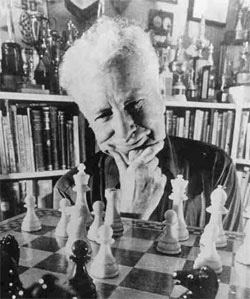
The Elo rating system is a method for calculating the relative skill levels of players in zero-sum games such as chess. It is named after its creator Arpad Elo, a Hungarian-American physics professor.
The rating percentage index, commonly known as the RPI, is a quantity used to rank sports teams based upon a team's wins and losses and its strength of schedule. It is one of the sports rating systems by which NCAA basketball, baseball, softball, hockey, soccer, lacrosse, and volleyball teams are ranked. This system was in use in Division I men's college basketball from 1981 through 2018 to aid in the selecting and seeding of teams appearing in the men's playoffs, and has been used in the women's tournament since its inception in 1982.

The men's FIFA World Ranking is a ranking system for men's national teams in association football, currently led by Belgium. The teams of the men's member nations of FIFA, football's world governing body, are ranked based on their game results with the most successful teams being ranked highest. The rankings were introduced in December 1992, and eight teams have held the top position, of which Brazil have spent the longest ranked first.
Jeff Sagarin is an American sports statistician known for his development of a method for ranking and rating sports teams in a variety of sports. His ratings have been a regular feature in the USA Today sports section since 1985, have been used by the NCAA Tournament Selection Committee to help determine the participants in the NCAA Men's Division I Basketball Championship tournament since 1984, and were part of the college football Bowl Championship Series throughout its history from 1998 to 2014.
This article presents a number of methodologies that have been suggested for the task of comparing the greatest chess players in history. Statistical methods offer objectivity but, while there is agreement on systems to rate the strengths of current players, there is disagreement on whether such techniques can be applied to players from different generations who never competed against each other.

A sports rating system is a system that analyzes the results of sports competitions to provide ratings for each team or player. Common systems include polls of expert voters, crowdsourcing non-expert voters, betting markets, and computer systems. Ratings, or power ratings, are numerical representations of competitive strength, often directly comparable so that the game outcome between any two teams can be predicted. Rankings, or power rankings, can be directly provided, or can be derived by sorting each team's ratings and assigning an ordinal rank to each team, so that the highest rated team earns the #1 rank. Rating systems provide an alternative to traditional sports standings which are based on win-loss-tie ratios.
Probabilistic forecasting summarizes what is known about, or opinions about, future events. In contrast to single-valued forecasts, probabilistic forecasts assign a probability to each of a number of different outcomes, and the complete set of probabilities represents a probability forecast. Thus, probabilistic forecasting is a type of probabilistic classification.

Kenneth Massey is an American sports statistician known for his development of a methodology for ranking and rating sports teams in a variety of sports. His ratings have been a part of the Bowl Championship Series since the 1999 season. He is an assistant professor of mathematics at Carson–Newman University in Tennessee.
The FIFA men's ranking system 1999–2006 is a calculation technique previously used by FIFA for ranking men's national teams in football (soccer). The ranking system was introduced by FIFA in 1999, as an update to an earlier system, and was replaced after the 2006 World Cup with a simplified system.
In American college football, the 2006 BCS computer rankings are a part of the Bowl Championship Series (BCS) formula that determines who plays in the BCS National Championship Game as well as several other bowl games. Each computer system was developed using different methods which attempts to rank the teams' performance. For 2006, the highest and lowest rankings for a team are dropped and the remaining four rankings are summed. A team ranked #1 by a computer system is given 25 points, #2 is given 24 points and so forth. The summed values are then divided by 100. The values are then ranked by percentage. This percentage ranking is then averaged with the Coaches Poll and Harris Poll average rankings, each receiving equal weight, and the results become the BCS Rankings.
In American college football, the 2007 BCS computer rankings are a part of the Bowl Championship Series (BCS) formula that determines who plays in the BCS National Championship Game as well as several other bowl games. Each computer system was developed using different methods which attempts to rank the teams' performance. For 2007, the highest and lowest rankings for a team are dropped and the remaining four rankings are summed. A team ranked #1 by a computer system is given 25 points, #2 is given 24 points and so forth. The summed values are then divided by 100. The values are then ranked by percentage. This percentage ranking is then averaged with the Coaches Poll and Harris Poll average rankings, each receiving equal weight, and the results become the BCS Rankings.
TrueSkill is a skill-based ranking system developed by Microsoft for use with video game matchmaking on Xbox Live. Unlike the popular Elo rating system, which was initially designed for chess, TrueSkill is designed to support games with more than two players.
A chess rating system is a system used in chess to calculate an estimate of the strength of the player, based on their performance versus other players. They are used by organizations such as FIDE, the US Chess Federation, International Correspondence Chess Federation, and the English Chess Federation. Most of the systems are used to recalculate ratings after a tournament or match but some are used to recalculate ratings after individual games. Popular online chess sites such as chess.com, Lichess, and Internet Chess Club also implement rating systems. In almost all systems a higher number indicates a stronger player. In general, players' ratings go up if they perform better than expected and down if they perform worse than expected. The magnitude of the change depends on the rating of their opponents. The Elo rating system is currently the most widely used.

Eugenio Torre is a Filipino chess player. In 1974, at 22 years old, he became the first Asian to qualify for the title Grandmaster by winning the bronze medal in the Chess Olympiad held in Nice, France. He is considered the strongest chess player the Philippines produced during the 1980s and 1990s, and has been playing for the Philippines on board 1 in eighteen Chess Olympiads.
Statistical Football prediction is a method used in sports betting, to predict the outcome of football matches by means of statistical tools. The goal of statistical match prediction is to outperform the predictions of bookmakers, who use them to set odds on the outcome of football matches.
The Billingsley Report is a college football rating system developed in the late 1960s to determine a national champion. Billingsley has actively rated college football teams on a current basis since 1970. Beginning in 1999, Billingsley's ratings were included as one of seven mathematical formulas included in the Bowl Championship Series (BCS) rankings.
Matrix factorization is a class of collaborative filtering algorithms used in recommender systems. Matrix factorization algorithms work by decomposing the user-item interaction matrix into the product of two lower dimensionality rectangular matrices. This family of methods became widely known during the Netflix prize challenge due to its effectiveness as reported by Simon Funk in his 2006 blog post, where he shared his findings with the research community. The prediction results can be improved by assigning different regularization weights to the latent factors based on items' popularity and users' activeness.
The FIFA men's ranking system 2006–2018 was a calculation technique previously used by FIFA for ranking men's national teams in football. The ranking system was introduced by FIFA after the 2006 FIFA World Cup, as an update to an earlier system, and was replaced after the 2018 World Cup with a revised Elo-based system.
The World Football Elo Ratings is a ranking system for men's national association football teams that is published by the website eloratings.net. It is based on the Elo rating system but includes modifications to take various football-specific variables into account, like the margin of victory, importance of a match, and home field advantage. Other implementations of the Elo rating system are possible and there is no single nor any official Elo ranking for football teams.
Colley Matrix is a computer-generated sports rating system designed by Dr. Wes Colley.




